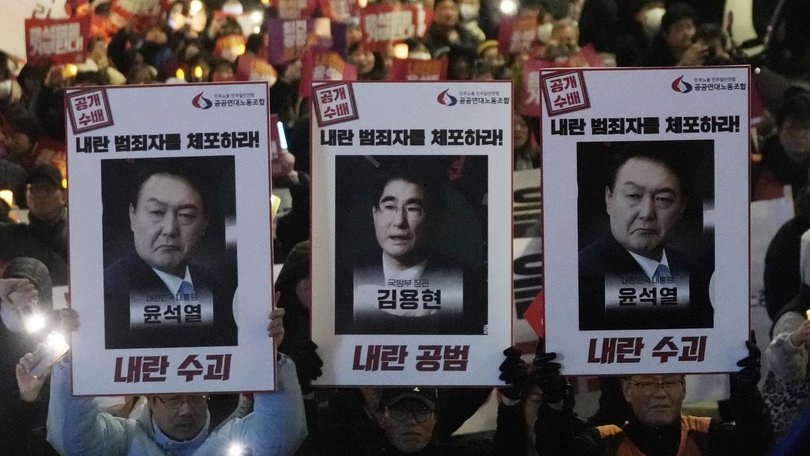South Korea martial law: Top cops detained over alleged role in enforcing President Yoon Suk-yeol decree
South Korea's national police chief and top officer in Seoul are being held over their alleged roles in the nation's surprising declaration of martial law.

South Korea’s two highest-ranked police officers have been detained to be investigated for their roles in enforcing President Yoon Suk-yeol’s short-lived martial law decree last week.
The development on Wednesday comes hours before the main liberal opposition Democratic Party submits a new motion to impeach Yoon as the country’s main law enforcement institutions expand their investigation into whether the president’s declaration amounted to rebellion.
The first impeachment attempt failed on Saturday when the ruling party boycotted the vote. The Democratic Party said it aims to put the new motion to a vote on Saturday.
Sign up to The Nightly's newsletters.
Get the first look at the digital newspaper, curated daily stories and breaking headlines delivered to your inbox.
By continuing you agree to our Terms and Privacy Policy.Yoon’s ill-conceived power grab has paralysed South Korean politics, frozen its foreign policy, and rattled financial markets, greatly reducing his chances of completing his five-year term and casting a turbulent shadow over one of Asia’s most robust democracies.
After last week’s impeachment motion fell through, the leader of Yoon’s conservative party pledged to arrange his stable exit from power, saying the party will co-ordinate with Cabinet members over state affairs and that Yoon will be sidelined from duties during a transition to an early election.
However, the plans have been widely criticised as unrealistic and unconstitutional. The constitution explicitly states that impeachment is the sole method for suspending presidential powers and that the authority to command the military rests solely with the president. The Defence Ministry said this week that Yoon remains in charge of the country’s military forces.
Earlier on Wednesday, Yoon’s former defence minister, Kim Yong-hyun, was arrested after a Seoul court approved a warrant for him on allegations of playing a key role in a rebellion and committing abuse of power. Kim became the first person arrested over the December 3 martial law decree.
Police said National Police Agency Commissioner General Cho Ji-ho and Kim Bong-sik, head of the metropolitan police agency of the capital, Seoul, were being held at Seoul’s Namdaemun police station.
They have been investigated for their roles in deploying police forces to the National Assembly in an attempt to block lawmakers from entering the parliament to vote to lift Yoon’s martial law decree, which was abruptly announced on the night of December 3.
The Assembly was also encircled by heavily armed troops, which military commanders say were deployed on the orders of the former defence minister. But enough lawmakers eventually managed to enter a parliament chamber and unanimously rejected Yoon’s decree, forcing the Cabinet to lift it before daybreak on December 4.
If Yoon is impeached, his presidential powers would be suspended until the Constitutional Court decides whether to restore his powers or remove him from office. If he is dismissed from office, a new presidential election would be required.
On Wednesday, North Korea’s state news agency for the first time reported about the political turmoil and street protests triggered by Yoon’s martial law decree. The report mostly attempted to explain the South Korean events though it used its typical abusive language like calling Yoon “a traitor” and his military “gangsters”.
Many experts say North Korea is sensitive to the domestic spread of news on massive anti-government protests in foreign countries because its own people have no official access to international news and could be affected by such events.
